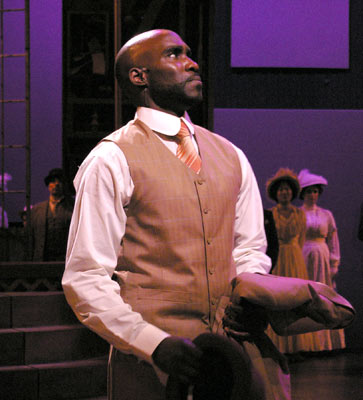Ragtime, presented by PCPA
At the Solvang Festival Theatre, Saturday, August 2. Shows through August 24.

“We’ll ride on the wheels of a dream,” sings the Harlem ragtime musician Coalhouse Walker Jr., echoing the longing of the many characters in this story who hope to fulfill the American Dream. Based on the 1975 novel by E.L. Doctorow, Ragtime was adapted for both cinema and stage. This PCPA production, which just opened its Solvang run, has successfully blended poignant lyricism with the dramatic events of the early 20th century in this complex tale, transforming a grand, ambitious story into a cohesive musical narrative.
Down from the original Broadway cast size of 59 to a still large group of 45, the ensemble nevertheless brimmed with vitality-the kind of raw energy needed for success at turn-of-the-century America. The dynamic succession of multiple storylines is woven smoothly to show the interconnection of unlikely individual fates. Father, a complacently successful businessman from New Rochelle, came here on an immigrant “rag ship,” but now looks down on more recent immigrants for their guttural accents, even while sometimes admiring their bravery. His wife, Mother, is initially grateful for his protection, but as time goes on, she grows increasingly aware of the gulf between them. Sheltering a black single mother, Sarah, and her baby boy, Mother demonstrates moral courage. As Mother, Elizabeth Stuart is exquisite throughout, but the lament for her lost illusions, “Back to Before,” is perhaps the most moving solo in the musical. Mother’s nurturing spirit is matched by Tateh-a fiercely loyal father determined to find success in America, despite poverty and discrimination. Enraged at a stranger’s proposition to sell his daughter, Tateh appeals to god in a passionate outcry. Tateh’s Latvian Jewish character-endearing, humorous, vulnerable, as well as cleverly entrepreneurial-is fully realized by the talented Andrew Philpot.
At its deepest level, Ragtime is the tragic story of Coalhouse Walker Jr. (David St. Louis), an African-American ragtime composer whose melodies haunt with a strange new beauty. When he plays the piano for Sarah, the enchanted Grandfather, a retired classicist, exclaims, “The Aeolians [ancient Greeks] never made such sounds!” However, not all are prepared to honor his talent or accept him as equal. In the climactic scene, Coalhouse’s prized possession, a Model T, is vandalized by firefighters shouting the most offensive word for a black man-over and over. The dramatic appearance of Henry Ford’s Model T onstage and the factory cogs and wheels in the backdrop panel resembled motifs from Charlie Chaplin’s Modern Times, suggesting not only success, but also inequity and alienation.
But all is not dark. Harry Houdini, the great magician (and immigrant), reminds us that anything is possible. Likewise, redemption is conceivable in the final image of the blended family: Christian, Jewish, and black. In the words of the director Mark Booher, Ragtime is “a journey toward hopefulness.”



